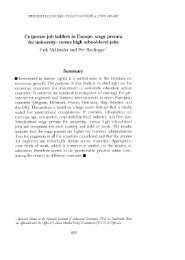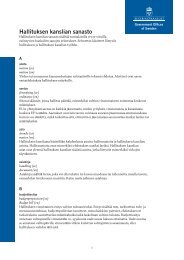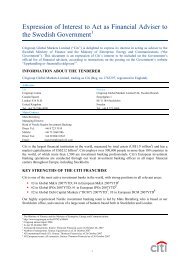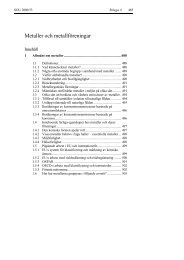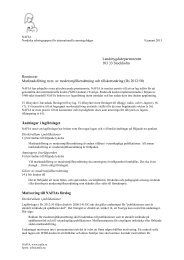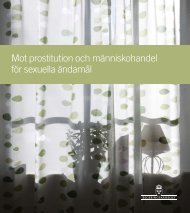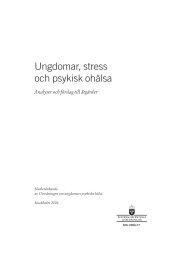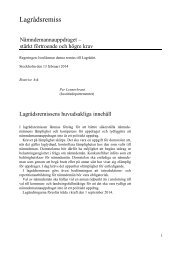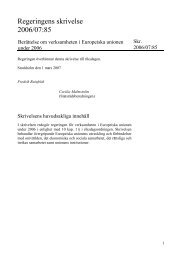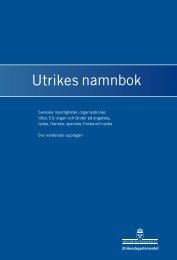- Page 1 and 2: Cirkulär migration och utveckling
- Page 3 and 4: Till statsrådet Tobias Billström
- Page 5 and 6: Innehåll Begreppsförklaringar ...
- Page 7 and 8: SOU 2010:40 Innehåll Befolkningen
- Page 9 and 10: SOU 2010:40 Innehåll 6.2 Social tr
- Page 11 and 12: SOU 2010:40 Innehåll 8.2 Sidas arb
- Page 13 and 14: Begreppsförklaringar Arbetskraftsd
- Page 15 and 16: SOU 2010:40 Begreppsförklaringar I
- Page 17 and 18: SOU 2010:40 Begreppsförklaringar S
- Page 19 and 20: Förkortningar AKI Arbetskraftsinva
- Page 21 and 22: Sammanfattning Regeringen beslutade
- Page 23 and 24: SOU 2010:40 Sammanfattning I princi
- Page 25 and 26: SOU 2010:40 Sammanfattning annan gr
- Page 27 and 28: SOU 2010:40 Sammanfattning det tidi
- Page 29 and 30: SOU 2010:40 Sammanfattning Remitter
- Page 31 and 32: SOU 2010:40 Sammanfattning utveckli
- Page 33 and 34: Summary SOU 2010:40 political conse
- Page 35 and 36: Summary SOU 2010:40 been in Sweden
- Page 37 and 38: Summary SOU 2010:40 on the Swedish
- Page 39: Summary SOU 2010:40 years but recen
- Page 43 and 44: 1 Utgångspunkter och avgränsninga
- Page 45 and 46: SOU 2010:40 Utgångspunkter och avg
- Page 47 and 48: SOU 2010:40 Utgångspunkter och avg
- Page 49 and 50: 2 Migration har under lång tid på
- Page 51 and 52: SOU 2010:40 Kartläggning av migrat
- Page 53 and 54: SOU 2010:40 Kartläggning av migrat
- Page 55 and 56: SOU 2010:40 Kartläggning av migrat
- Page 57 and 58: 3 Kartläggning av migration och ci
- Page 59 and 60: SOU 2010:40 Kartläggning av migrat
- Page 61 and 62: SOU 2010:40 Kartläggning av migrat
- Page 63 and 64: SOU 2010:40 Kartläggning av migrat
- Page 65 and 66: SOU 2010:40 Kartläggning av migrat
- Page 67 and 68: SOU 2010:40 Kartläggning av migrat
- Page 69 and 70: SOU 2010:40 Kartläggning av migrat
- Page 71 and 72: SOU 2010:40 Kartläggning av migrat
- Page 73 and 74: SOU 2010:40 Kartläggning av migrat
- Page 75 and 76: SOU 2010:40 Kartläggning av migrat
- Page 77 and 78: SOU 2010:40 Kartläggning av migrat
- Page 79 and 80: SOU 2010:40 Kartläggning av migrat
- Page 81 and 82: SOU 2010:40 Kartläggning av migrat
- Page 83 and 84: SOU 2010:40 Kartläggning av migrat
- Page 85 and 86: SOU 2010:40 Kartläggning av migrat
- Page 87 and 88: 4 Speciella kategorier av migranter
- Page 89 and 90: SOU 2010:40 Speciella kategorier av
- Page 91 and 92:
SOU 2010:40 Speciella kategorier av
- Page 93 and 94:
SOU 2010:40 Speciella kategorier av
- Page 95 and 96:
SOU 2010:40 Speciella kategorier av
- Page 97 and 98:
SOU 2010:40 Speciella kategorier av
- Page 99 and 100:
SOU 2010:40 Speciella kategorier av
- Page 101 and 102:
SOU 2010:40 Speciella kategorier av
- Page 103 and 104:
SOU 2010:40 Speciella kategorier av
- Page 105 and 106:
SOU 2010:40 Speciella kategorier av
- Page 107 and 108:
SOU 2010:40 Speciella kategorier av
- Page 109 and 110:
SOU 2010:40 Speciella kategorier av
- Page 111 and 112:
5 Migration och arbetsmarknad 5.1 U
- Page 113 and 114:
SOU 2010:40 Migration och arbetsmar
- Page 115 and 116:
SOU 2010:40 Migration och arbetsmar
- Page 117 and 118:
SOU 2010:40 Migration och arbetsmar
- Page 119 and 120:
SOU 2010:40 Migration och arbetsmar
- Page 121 and 122:
SOU 2010:40 Migration och arbetsmar
- Page 123 and 124:
SOU 2010:40 Migration och arbetsmar
- Page 125 and 126:
SOU 2010:40 Migration och arbetsmar
- Page 127 and 128:
SOU 2010:40 Migration och arbetsmar
- Page 129 and 130:
SOU 2010:40 Migration och arbetsmar
- Page 131 and 132:
Förutsättningarna för cirkulär
- Page 133 and 134:
Förutsättningarna för cirkulär
- Page 135 and 136:
Förutsättningarna för cirkulär
- Page 137 and 138:
Förutsättningarna för cirkulär
- Page 139 and 140:
Förutsättningarna för cirkulär
- Page 141 and 142:
Förutsättningarna för cirkulär
- Page 143 and 144:
Förutsättningarna för cirkulär
- Page 145 and 146:
Förutsättningarna för cirkulär
- Page 147 and 148:
Förutsättningarna för cirkulär
- Page 149 and 150:
Förutsättningarna för cirkulär
- Page 151 and 152:
Förutsättningarna för cirkulär
- Page 153 and 154:
Förutsättningarna för cirkulär
- Page 155 and 156:
Förutsättningarna för cirkulär
- Page 157 and 158:
Förutsättningarna för cirkulär
- Page 159 and 160:
Förutsättningarna för cirkulär
- Page 161 and 162:
Förutsättningarna för cirkulär
- Page 163 and 164:
Cirkulär migration och utveckling
- Page 165 and 166:
Cirkulär migration och utveckling
- Page 167 and 168:
Cirkulär migration och utveckling
- Page 169 and 170:
Cirkulär migration och utveckling
- Page 171 and 172:
Cirkulär migration och utveckling
- Page 173 and 174:
Cirkulär migration och utveckling
- Page 175 and 176:
Cirkulär migration och utveckling
- Page 177 and 178:
Cirkulär migration och utveckling
- Page 179 and 180:
Cirkulär migration och utveckling
- Page 181 and 182:
Cirkulär migration och utveckling
- Page 183 and 184:
Cirkulär migration och utveckling
- Page 185 and 186:
Cirkulär migration och utveckling
- Page 187 and 188:
Cirkulär migration och utveckling
- Page 189 and 190:
Cirkulär migration och utveckling
- Page 191 and 192:
Cirkulär migration och utveckling
- Page 193 and 194:
Cirkulär migration och utveckling
- Page 195 and 196:
Cirkulär migration och utveckling
- Page 197 and 198:
Cirkulär migration och utveckling
- Page 199 and 200:
Cirkulär migration och utveckling
- Page 201 and 202:
Cirkulär migration och utveckling
- Page 203 and 204:
Cirkulär migration och utveckling
- Page 205 and 206:
Cirkulär migration och utveckling
- Page 207 and 208:
Cirkulär migration och utveckling
- Page 209 and 210:
Cirkulär migration och utveckling
- Page 211 and 212:
Svenska myndigheters arbete med mig
- Page 213 and 214:
Svenska myndigheters arbete med mig
- Page 215 and 216:
Svenska myndigheters arbete med mig
- Page 217 and 218:
Svenska myndigheters arbete med mig
- Page 219 and 220:
Svenska myndigheters arbete med mig
- Page 221 and 222:
Cirkulär migration och utveckling
- Page 223 and 224:
Cirkulär migration och utveckling
- Page 225 and 226:
Cirkulär migration och utveckling
- Page 227 and 228:
Cirkulär migration och utveckling
- Page 229 and 230:
Cirkulär migration och utveckling
- Page 231 and 232:
10 Migration i ett globalt perspekt
- Page 233 and 234:
SOU 2010:40 Migration i ett globalt
- Page 235 and 236:
SOU 2010:40 Migration i ett globalt
- Page 237 and 238:
SOU 2010:40 Migration i ett globalt
- Page 239 and 240:
SOU 2010:40 Migration i ett globalt
- Page 241 and 242:
11 Kommitténs slutsatser och forts
- Page 243 and 244:
SOU 2010:40 Kommitténs slutsatser
- Page 245 and 246:
SOU 2010:40 Kommitténs slutsatser
- Page 247 and 248:
SOU 2010:40 Kommitténs slutsatser
- Page 249 and 250:
SOU 2010:40 Kommitténs slutsatser
- Page 251 and 252:
SOU 2010:40 Kommitténs slutsatser
- Page 253 and 254:
Käll- och litteraturförteckning S
- Page 255 and 256:
Käll- och litteraturförteckning S
- Page 257 and 258:
Käll- och litteraturförteckning S
- Page 259 and 260:
Käll- och litteraturförteckning S
- Page 261 and 262:
Käll- och litteraturförteckning S
- Page 263 and 264:
Käll- och litteraturförteckning S
- Page 265 and 266:
Käll- och litteraturförteckning S
- Page 267 and 268:
Bilaga 1 SOU 2010:40 Bakgrund Samba
- Page 269 and 270:
Bilaga 1 SOU 2010:40 för allmänna
- Page 271 and 272:
Bilaga 1 SOU 2010:40 medlemslandet.
- Page 273 and 274:
Bilaga 1 SOU 2010:40 t.ex. kan finn
- Page 275 and 276:
Bilaga 1 SOU 2010:40 välfärdssyst
- Page 277 and 278:
Bilaga 1 SOU 2010:40 arbetskraft me
- Page 279 and 280:
Bilaga 1 SOU 2010:40 I slutbetänka
- Page 281 and 282:
Bilaga 2 SOU 2010:40 Relationerna m
- Page 283 and 284:
Bilaga 2 SOU 2010:40 svenskt regeri
- Page 285 and 286:
Bilaga 2 SOU 2010:40 liga rättighe
- Page 287 and 288:
Bilaga 2 SOU 2010:40 Etiopien - bå
- Page 289 and 290:
Bilaga 2 SOU 2010:40 Indien är ett
- Page 291 and 292:
Bilaga 2 SOU 2010:40 man den indisk
- Page 293 and 294:
Bilaga 2 SOU 2010:40 områden finns
- Page 295 and 296:
Bilaga 2 SOU 2010:40 IOM har omfatt
- Page 297 and 298:
Bilaga 2 SOU 2010:40 etablera diplo
- Page 299 and 300:
Bilaga 2 SOU 2010:40 turismen komme
- Page 301 and 302:
Bilaga 2 SOU 2010:40 Kinesiska för
- Page 303 and 304:
Bilaga 2 SOU 2010:40 Somaliafrågan
- Page 305 and 306:
Bilaga 2 SOU 2010:40 tog sig nära
- Page 307 and 308:
Bilaga 2 SOU 2010:40 Turkiet Befolk
- Page 309 and 310:
Bilaga 2 SOU 2010:40 Moldavien, Ukr
- Page 311 and 312:
Bilaga 2 SOU 2010:40 inflyttning f
- Page 313 and 314:
Bilaga 2 SOU 2010:40 viktigaste inc
- Page 315 and 316:
Bilaga 3 SOU 2010:40 Corruption Ind
- Page 317 and 318:
Bilaga 3 SOU 2010:40 Child Developm
- Page 319 and 320:
Bilaga 3 SOU 2010:40 Utvecklingsind
- Page 321 and 322:
37. Sverige för nyanlända utanfö
- Page 323:
Gemensamt ansvar och gränsöversti



